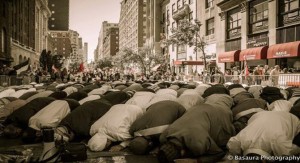Originally posted 2024-02-26 06:17:26.

Amidst chow downs, midterms, and movies, finding time to pray for youth has become somewhat of a difficult task.
Where Has Our Prayer Gone?
Amidst chow downs, midterms, and movie nights, finding time to pray has become a challenge for many youth today. Hours are easily consumed by the latest songs, social media trends, or even endless school assignments. These have become our priorities in this life—but what about our priorities for the Hereafter?
We struggle to dedicate even five minutes of our 1,440-minute day to prostrate before our Lord, repenting for our sins and seeking refuge from our worries. We’ve stopped giving salah (prayer) the importance it holds.
Salah is not a choice—it is an obligation. Unfortunately, many Muslims today treat it otherwise. But prayer is one of the few acts that Allah (glorified is He) directly prescribed—not merely suggested. And I say “prescribed” because it is the truest remedy for the ailments of our hearts and the worries of our worldly life.
“Guard strictly the [five obligatory] prayers, especially the middle prayer, and stand before Allah with devotion.”
(Al-Baqarah 2:238)
Salah grounds us. It reminds us of Allah in the early morning, keeps us connected throughout the chaos of the day, and tucks us in with remembrance at night.
Prayer: A Priority for the Soul
Fulfillment in life requires nourishment—and what better nourishment than Allah’s mercy, guidance, and reward? He calls us to prayer with promises of eternal beauty, describing Jannah in vivid detail while warning us of the painful consequences of heedlessness.
“Their reward is Paradise and garments of silk, because they were patient. Reclining on raised thrones, they will see no burning sun nor freezing cold. The shade will come close…”
(Al-Insan 76:12–14)
From the very beginning of human history, prayer has held its place. When Allah created Adam, all beings were commanded to bow—not in worship, but to honor the creation of Allah. Satan refused, and his arrogance led to eternal damnation.
Every Prophet since has been sent with a message rooted in worship. Prayer has always been central.
“My Lord, make me one who establishes prayer, and [also] from my descendants. Our Lord, accept my supplication.”
(Ibrahim 14:40)
“Indeed, I am Allah. There is no deity except Me, so worship Me and establish prayer for My remembrance.”
(Ta-Ha 20:14)
“And establish prayer, give zakat, and bow with those who bow [in worship].”
(Al-Baqarah 2:43)
When Prayer Becomes a Taboo
As I sit with friends and the time for prayer approaches, I quietly slip away to a quiet room to fulfill my duty to my Creator. But why quietly? Why carefully? Why do I feel awkward letting fellow Muslims know I’m going to pray, especially when they choose not to? Worship has become a taboo in our circles—a silent, uncomfortable thing. This mindset must be challenged.
As a convert, this reality is especially jarring. To see Muslims abandon prayer feels contradictory and disheartening. The Qur’an and Sunnah are filled with clear warnings about neglecting salah and glowing praise for those who uphold it. Every prayer we offer builds our account of good deeds. And on the Day of Judgment, those deeds will be weighed.
The Mark of Sujud
The Prophet (peace be upon him) said:
“When Allah finishes judging mankind, He will command the angels to bring out of Hell those upon whom He wishes to bestow His mercy—those who never associated others in worship with Him and who used to say ‘La ilaha illallah.’ The angels will recognize them by the marks of sujud (prostration) on their foreheads. The Fire will consume everything except the marks of prostration, which Allah has forbidden it to burn. They will be brought out, and the water of life will be poured over them, and they will grow like seeds left by a flood.”
(Muslim)
Salah will distinguish the believer even in Hell—it is a defining mark of faith.
Unlike many other religions where worship is limited to supplication, in Islam, prayer is a complete physical, mental, and spiritual devotion. It involves the whole being, fully directed toward glorifying and submitting to Allah.
Tawakkul and the Remedy of Salah
Today’s world places heavy pressures on the Ummah. But the solution is deceptively simple: remain steadfast in prayer and place our trust—tawakkul—in Allah. We all have a deep-seated need to feel accepted, to feel seen. That need is perfectly fulfilled by the One who created us.
The Prophet (peace be upon him) said:
“The closest a servant is to his Lord is while in prostration, so make plenty of du’a (supplication) during it.”
(Al-Bukhari)
We long to grow in faith, but like buildings, our growth must be supported by strong pillars. Salah is one of the five pillars of Islam—the second, right after the testimony of faith.
What’s striking is that while fasting can be excused for illness, and zakat and Hajj excused for poverty, salah has no true excuse. Even if one is too ill to stand, they may pray sitting. If unable to sit, they may pray lying down. If even that is impossible, one may pray with the eyes. In short: no excuses.
Building Inward Beauty
Today’s world is obsessed with outward beauty. Islam, however, prioritizes inner purification. Salah is a path to that purification. It’s a pause, a moment of reflection, a return to the One who never leaves us—even when we leave Him.
Let us commit, even just a few minutes each day, to prostrating to the Almighty. To thanking Him. To asking from Him. To worshipping Him in the way He commanded.
May Allah help us uphold His command, cleanse our hearts, and enter His Paradise.
Ameen.
_____________________
Source: suhaibwebb.com.
 Arabic
Arabic English
English

